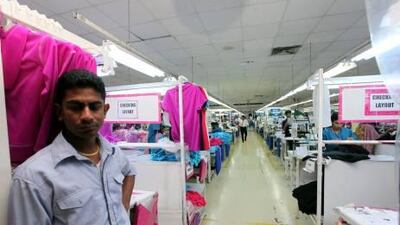IRBID, Jordan // When a factory worker told Jordanian police she had been raped three times by her boss, the case escalated into an international campaign that threatens to close down the country's largest garment exporter to the US.
It could also force government and business to do more to improve conditions in an industry that has been crucial to this kingdom's economy - and to its relations with the US.
The 27-year-old Bangladeshi seamstress took her allegations to police in June. She had worked at the Classic Fashion plant for four months.
The Sri Lankan manager she accused has been charged with rape by Jordanian prosecutors and faces up to 15 years in prison. The manager, who is 46, denies the allegations.
Classic, with annual exports of US$125 million (Dh458.8m), is Jordan's largest garment exporter to the US, producing a Hanes line sold at Target and other clothing for giant retailers including Wal-Mart, Macy's, Kohl's and Land's End.
Jordan's trade ministry figures show that Classic's exports accounted for nearly 13 per cent of Jordan's $1 billion garment exports to the US last year.
Overall, garment exports make up roughly a fifth of the country's gross domestic product. The Institute for Global Labour and Human Rights, a US watchdog that helped the woman report the alleged rape, says abuses are rampant at the factory, which employees about 4,900 workers, most of them women from South Asia.
Victims are usually too afraid to report incidents, the institute said.
Workers at the Classic factory, outside the city of Irbid near the Syrian border, appeared fearful during a recent visit.
Managers lined up six roommates of the woman who reported the rape for interviews in a small cubicle.
Two factory inspectors kept peeking through the cubicle's windows, and the women constantly looked over their shoulders at them.
Only two were willing to answer questions, and they trembled as they spoke.
Mosamoth Sheifali, 20, a Bangladeshi who shared a dormitory room with the woman who reported the rape, said: "She was a good woman, whose family was poor and in need of money. I never mingled with her because she kept to herself."
Another Bangladeshi roommate, Cumilla, 28, who would only give her first name, said: "I don't know why she said bad things about [the accused]. He is a good man."
The accused, a medium-built, soft-spoken father of two, also spoke. "I'm innocent and I've never seen this girl until the day she complained to police," he said, pointing his finger in anger, his voice cracking.
The Institute for Global Labour and Human Rights said the manager's accuser will not give interviews.
The labour rights watchdog claims at least 300 young workers have been raped by Classic managers since 2007.
It also accuses managers of beating workers, forcing them to work long shifts with few breaks, refusing to pay their salaries and intimidating the women into silence by threatening to have them deported.
Sanal Kumar, Classic's managing director, denied the charges and accused US labour unions of being behind them.
"They want to see all those plants abroad move to the US to provide jobs to the Americans," he said.
He also blamed Israel, saying its supporters had influenced the Institute for Global Labour and Human Rights.
Companies like Classic have their roots in a project launched in the 1990s to boost peace with Israel. It allowed duty-free exports to the US to factories in Jordan that used a certain proportion of Israeli inputs. Mr Kumar said Israel is angry that many factories largely abandoned the connection with the country after duty-free eligibility was broadened in Jordan.
The labour rights institute damned Mr Kumar's accusations as "nonsense".
Days after news of the rape allegations emerged, the US retailers Kohl's, Macy's and Land's End stopped placing orders with Classic, Mr Kumar said.
Within four weeks, Classic's losses had reached $10 million (Dh37m) eight per cent of its annual exports, he said.
The labour ministry undersecretary, Khleif Khawaldeh, said there may have been "some deficiencies in our labour regulations and practices but we're continuously seeking to improve them".
Jordanians fear the Classic case will encourage American businesses to shun output from Jordan.
Samir Maqdah, a union leader assisting the factories, said: "Why should the Jordanian industry bear the brunt of such actions by a foreign factory manager?" He said if the manager is guilty, the manager should be punished.

